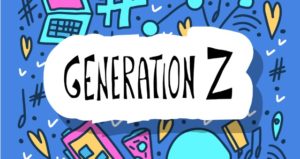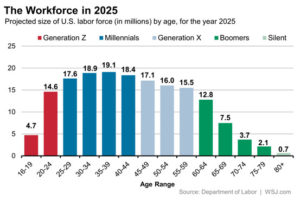
Let’s recap who the Millennials, Gen Z, and the new Alpha Generation are. Millennials are currently the largest working population in the United States. Millennials are ages 27-42 (Pew Research April 2023). They are:
- 35% of the US workforce are millennials.
- Millennials are currently 25% of the world’s population.
- Millennials will represent 75% of the global workforce by 2025.
Generation Z was born between 1997 and 2012 (ages 11-26). They are:
- 6% of the US workforce is Gen Z
- Gen Z is currently 30 percent of the world’s population.
- Gen Z will represent 27% of the global workforce by 2025 (Pew Research April 2023)
Our future workforce is Generation Alpha; this generation follows Generation Z and includes all children born in or after 2010. Much of this demographic is under 11 years of age, but the oldest of them will become teens in 2025 (Pew Research, March 2023)
First, what makes Gen Z different than other generations? Obviously, they have no memory of a time without technology and global online connections. This generation completed their education or started their careers during the Pandemic. According to the Conference Board Report, 2023, “Gen Zers demonstrate a high degree of mental health awareness, largely because 46 percent of them report being stressed or anxious all or most of the time. Gen Zers display a heightened sense of social justice and willingness to challenge the status quo. In addition, Gen Z is by far the most racially diverse of working generations in the US, with 48 percent White, 24 percent Hispanic, 13 percent Black, 5 percent Asian, and 10 percent other (compared with early baby boomers, who are 68 percent White)“.
Employers need to understand the Gen Z population in order to hire and inspire them. According to the Conference Board Report, Gen Z desires five imperatives to be attracted, retained, and engaged in the workforce.
- Adequate compensation. Gen Z’s are transparent in sharing their compensation with others and online. Fair compensation is about equity and respect. This generation grew up during the high inflation, student loan debt, and lack of internships and opportunities because of the Pandemic. Gen Z is concerned about their ability to afford housing, transportation, and other necessities. Companies must review their compensation practices to include transparency, starting salaries, and promotion compensation.
- Control. This may be heartburn for employers. Control tof Gen Z means the opportunity to control their schedule. If it is a professional position, it may be working hybrid. They like employee interaction and enjoy people connection, so you can have them come to the office on certain days. That may be because of the Pandemic and being isolated for three years. Hourly employees want control over their shift schedules. They need to know in advance so they can schedule their personal time. Companies should give Gen Z as much control over their work and schedule.
- Safety and well-being. Because of the global pandemic, Gen Z is concerned about safety and wellness. Companies that have customer-facing positions need to support their physical security. They want to pursue mental and physical wellness in their lives. During the Pandemic, much of this Generation was consumed by stress, anxiety, and depression. Companies should promote their workplace as a safe and healthy work environment concerned with wellness. If you can encourage wellness programs, that will go a long way with Gen Z.
- Opportunities and recognition. Employers who offer growth opportunities will win with Gen Z. Gen Z will leave the company if they feel they cannot grow with the company. Furthermore, Gen Z is eager to learn and share their knowledge of technology. They also want to be recognized for their accomplishments and learning. Provide opportunities for all employees to be recognized for their successes. Gen Z will love this.
- Live your company’s purpose and values. Gen Z wants to understand the company’s mission, values, and purpose. Gen Z will leave if the company does not have the same values as theirs. Gen Z also wants to know why they are doing a task and how that aligns with the company’s purpose. Employers should communicate their values, mainly how they treat and communicate with their employees.
I know some of these may be difficult for some employers, but this is definitely a new generation and a new era of the workplace. Post the pandemic; workplaces have forever changed. Now we have a new group of workers needing employment, and these tips can help you KEEP THEM!
Call us if you have generational workplace concerns. We are here to help your business!

References:
Pew Research Center (April/May 2023). https://www.pewresearch.org/
Conference Board Report (March 3, 2023). Gen Z Rising: Attracting, Engaging, and Retaining the Workforce of the Future. https://www.conference-board.org/topics/future-of-work/Gen-Z-attracting-retaining-future-workforce
SHRM.org. (March 2023) Gen Z Expects Mental Wellness Support from Employers.
